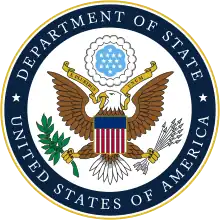 Seal of the United States Department of State | |
| Bureau overview | |
|---|---|
| Formed | 1977[1] |
| Jurisdiction | Executive branch of the United States |
| Employees | 100 (as of 2003)[1] |
| Annual budget | $38.5 million (As of 2003)[1] |
| Bureau executive |
|
| Parent department | U.S. Department of State |
| Website | Official Website |
The Bureau of Democracy, Human Rights and Labor Affairs (DRL) is a bureau within the United States Department of State. The bureau is under the purview of the Under Secretary of State for Civilian Security, Democracy, and Human Rights.
DRL's responsibilities include promoting democracy around the world, formulating U.S. human rights policies, and coordinating policy in human rights-related labor issues. The Office to Monitor and Combat Anti-Semitism is a separate agency included in the Bureau.
The Bureau is responsible for producing annual reports on the countries of the world with regard to religious freedom through its Office of International Religious Freedom[2] and human rights.[3][4] It also administers the U.S. Human Rights and Democracy Fund (HRDF), which is DRL's flagship program.[5]
The head of the Bureau is the Assistant Secretary of State for Democracy, Human Rights, and Labor, and the official currently acting in this capacity is Erin Barclay.
The bureau was formerly known as the Bureau of Human Rights and Humanitarian Affairs, but was reorganized and renamed in 1994, to reflect both a broader sweep and a more focused approach to the interlocking issues of human rights, worker rights, and democracy.[6]
Examples of DRL's human rights advocacy in foreign locations include China,[7] the Middle East,[8] and Russia.[9]
From 2011 to 2015, DRL provided financial support to the Tor network (The Onion Router).[10][11][12][13]
Organization
The Bureau of Democracy, Human Rights, and Labor is divided into twelve offices.[14][15]
- Office of Country Reports and Asylum Affairs – Prepares the State Department's annual reports, including the Country Reports on Human Rights
- Office of International Religious Freedom – Supports the United States Ambassador-at-Large for International Religious Freedom
- Office of Policy Planning and Public Diplomacy
- Office for Africa – Monitors human rights in Africa
- Office for East Asia and the Pacific – Monitors human rights in East Asia
- Office for Near East Asia – Monitors human rights in the Middle East
- Office for Western Hemisphere – Monitors human rights in Latin America
- Office for South Central Asia – Monitors human rights in Central Asia
- Office of Global Programming
- Office of Multilateral and Global Affairs – Formulates and implements U.S. government policy on human rights in multilateral organizations, including the UN Human Rights Council, the UN General Assembly, the UN Security Council, the Office of the High Commissioner for Human Rights, the European Union, the Organization of American States, the African Union, and the Association of Southeast Asian Nations
- Office of International Labor Rights – Advises on policies and initiatives in tandem with the International Labour Organization
- Executive Office
References
- 1 2 3 "Inspection of the Bureau of Democracy, Human Rights, and Labor" (PDF). Inspector General of the Department of State. September 2003. Archived from the original (PDF) on December 22, 2016. Retrieved April 1, 2016.
- ↑ "Religious Freedom". Office of International Religious Freedom. Bureau of Democracy, Human Rights, and Labor. Retrieved March 15, 2015.
- ↑ "Human Rights Reports". U.S. Department of State. Retrieved 21 December 2013.
- ↑ Wagner, Elizabeth. "2021 Country Reports on Human Rights Practices". United States Department of State. Retrieved 2022-07-06.
- ↑ "DRL Programs, Including Human Rights Democracy Fund (HRDF)". 2001-2009.state.gov. 2007-06-29. Retrieved 2022-07-12.
- ↑ "1999 Country Reports on Human Rights Practices". U.S. Department of State. February 2000. Retrieved July 6, 2016.
- ↑ Kine, Phelim (13 April 2022). "China activists call for reboot of State Dept. annual human rights report". POLITICO. Retrieved 2022-07-21.
- ↑ "Stop '$1-million grants to anti-Israel NGOs,' Republicans tell Blinken". The Jerusalem Post | JPost.com. Retrieved 2022-07-21.
- ↑ Thebault, Reis. "As Putin insists war will continue, Biden describes invasion as 'genocide'". The Washington Post. Retrieved 2022-07-21.
- ↑ Jeffries, Adrianne (2014-06-16). "The Pentagon is trying to make the internet more anonymous". The Verge. Retrieved 2022-07-26.
- ↑ "Using peer-to-peer technology to crowdsource a way around online censorship". The Washington Post. Retrieved August 10, 2022.
- ↑ Eddy, Max (2015-02-04). "Inside the Dark Web". PCMag UK. Retrieved 2022-08-16.
- ↑ "Tax return filing instructions" (PDF). torproject.org. Retrieved August 18, 2022.
- ↑ "1 FAM 510 Bureau of Democracy, Human Rights, and Labor (DRL)" (PDF). Foreign Affairs Manual. U.S. Department of State. June 13, 2012. Retrieved January 30, 2016.
- ↑ "State Department Student Internship Brochure" (PDF). U.S. Department of State, Bureau of Human Resources. September 2014. Retrieved December 10, 2015.
External links
- Bureau of Democracy, Human Rights, and Labor official website
- HumanRights.gov
- Official page on Facebook
- Bureau of Democracy, Human Rights and Labor on AllGov.com